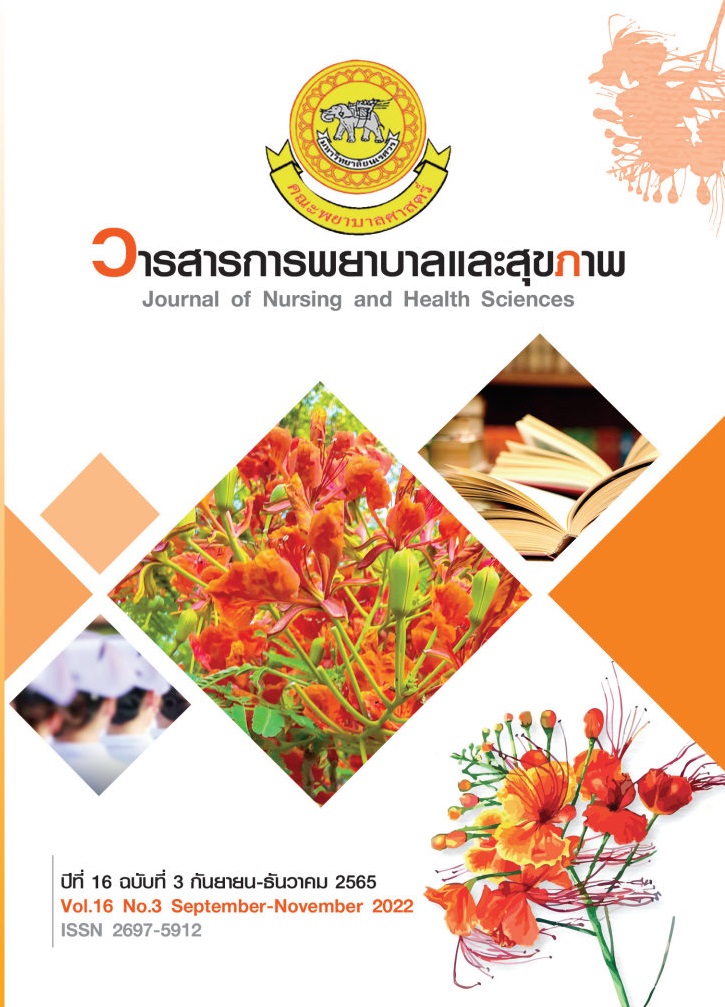Effectsof Self-Management Promotion Program Using LINE Application on Health Behaviors and A1C Levels among Uncontrolled Diabetes Patients
Main Article Content
Abstract
The purpose of this quasi-experiment research was to study the effects of self-management promotion program using LINE application on health behaviors and A1C levels in uncontrolled diabetes patients. The samples were 60 type 2 uncontrolled diabetes mellitus patients. The 30 participants of the experimental group received the self-management promotion program for 12 weeks, which was developed by the researcher based on the self-management concept of Kanfer and Gaelick-Buys while the 30 participants of the control group received conventional nursing care. Research tools consisted of the self-management promotion program and a questionnaire on health behaviors. The research tools were content validated by five experts with Content Validity Index of 0.80 and Cronbach’s alpha coefficient at 0.80. Data were analyzed by using frequency, percentage, mean, standard deviation, paired t-test and independent t-test.
The results were that the mean scores of health behaviors in the experimental group were significantly higher than before intervention and also higher than the control group. The mean level A1C was lower than before the program and those control group with significant at p<.001. This results can promote the effects of self-management promotion program using LINE application which modified health behaviors and decreased A1C levels of type 2 uncontrolled diabetes patients.
Article Details

This work is licensed under a Creative Commons Attribution-NonCommercial-NoDerivatives 4.0 International License.
References
Buathongkhamwisat, P., Pinchaleaw, D., & Moolsart,
S. (2017). The effectiveness of self-manage
ment program on type 2 diabetic patients in
Thakor, Maesuai district, Chianrai province.
Journal of the police nurses. 9(1), 105-116.
Diabetes Association of Thailand, Endocrine
Society of Thailand, Department of Medical
Services, & National Health Security Office.
(2017). Clinical Practice Guidelines for
Diabetes 2017. (3rded.). Pathum Thani:
Romyen Media Company Limited. [In Thai].
Kanfer, F. H., & Gaelick-Buys, L. (1991). Self-man
agement methods. In Kanfer, F. H.,
& Goldstein, A.P.(Eds.), Helping people
change: A textbook of methods, (4thed.),
NewYork: Pergamon Press.
Kitcharoenchai, R. (2013). The Effectiveness of a
nutritional self-management program on food
consumption behaviors, HbA1C, and body
mass index in persons with type 2 diabetes.
(Master thesis). Chonburi: Burapha University.
Kongsup, J., & Methakanjanasak, N. (2012).
Self-management in exercise physical
activity in patient with type 2 diabetes.
Journal of Nurses' Association of Thailand,
North-Eastern Division, 30(2), 50-64.
Meenon, T., & Kitreerawutiwong, N. (2018). Factors
predicting Medication Taking Behavior
among Type 2 Diabetic Patients.Nursing
Journal of the Ministry of Public Health.
(1), 50-60.
Ministry of Digital Economy and Society. (2020).
Thailand Internet User Behavior 2019.
Retrieved 20 December 2021 from https://
www.etda.or.th/th/Useful-Resource/
publications/Thailand-Internet-UserBehavior-2019_EN.aspx.
Muangsiri, Y., Kunsongkeit, W., & Keeratiyutawong,
P. (2013). Effect of competency Promoting
program for self-management of diabetes
mellitus patient on glycosylated hemoglobin
A1C. The journal of faculty of nursing
burapha university. 21(1), 37-51.
Munsrakeat, K., Rawiworrakul, T., & Lagampan, S.
(2019). Effects of self-management program
for Glycemic control among insulin dependent
type 2 diabetes patients. The journal of
Baromrajonani college of nursing,
Nakhonratchasima. 25(2), 87-103.
Namphathai S. (2018). The effect of a diabetes selfmanagement program on glycemic control
behaviors and hemoglobin A1c of uncontrolled
type 2 diabetic patients. Master's Thesis
(Nursing), Christian University, Nakhon Pathom.
[In Thai].
Sitkulanan, P., & Kumtip, P. (2020). Impact of a SelfManagement Programme Monitored through
the Application LINE on Eating Behaviour,
Arm-Swing Exercise Behaviour, and Blood
Glucose Levels in Women with Gestational
Diabetes Mellitus. Thai Journal of Nursing
Council. 35(2), 52-69.
Thangkratok P. (2017). The Role of the Nurse in the
Chronic Disease Management.
Songklanagarind Journal of Nursing.
(2), 154-159.
Thienthaworn, V. (2013). Surveillance system, control
and prevention of diabetes, high blood
pressure in Thailand: Policy to Practice
(3rded). Bangkok : Agricultural Cooperative
Society of Thailand Limited.
Toonkeaw, N., Aunban, P., Chandeekeawchakool, S.
(2018) Effects of Health Behavior Changing
Program (Food, Exercise, Emotion, Smoking
and Alcohol Cessation, Medicine taking) and
Vichai's 7 Color Balls Model on Knowledge
of Health Behavior and Blood Sugar Levels
of Diabetic Patients. Journal of the Nurses
Association of Thailand Northern office, 24(2),
-95.
Uthai Thani Provincial Public Health Office. (2020).
Information for responding to Service Plan,
Non-Communicable Diseases Branch.
Retrieved 9 October 2020, from https://uti.
hdc.moph.go.th/hdc/reports/report.php?
source=pformated/format1.php&cat_id=b2b59
e64c4e6c92d4b1ec16a599d882b&id=137
a726340e4dfde7bbbc5d8aeee3ac3


